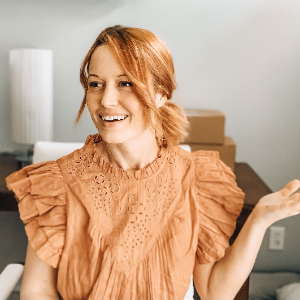Quick History Of Minimalism and Why It's a Thing
Nov 06, 2023
Ever wonder where minimalism started or how it turned into more than a style of art and became a way of life? From ancient philosophies to modern art, it's all shaped the chill, less-is-more vibe we see today. So, are you ready to deep dive into this minimalist journey with me?
What Is Minimalism As A Lifestyle?
Here I am, adding my name to the many "minimalist influencers" who have tried to put a definition on what minimalism means to them...so let's do this.
I want to start by saying that this lifestyle not only can look differently for everyone, but it has to. I'm a content creator with two teens, an infant, a pup and a mortgage. My minimalist routines, habits, style, and practice for sure look different than a 20-something traveling the globe from a backpack.
Something can be more than one thing.

In my mind minimalism boils down to a practice of awareness and intention regarding your belongings, time, and energy, where excess is rejected and less is embraced. It feels good to me- not in a superior, high-strung way, but in a freeing way.
It's easy to confuse a minimalist lifestyle with minimalist design- after all, the word was coined by the arts before it translated over to a way of living. Of course, you can't boil a way of living down to a physical form or style. In design and art (whether physical, visual, or audio), minimalism would be characterized by extreme scarcity.
When you see simple white and neutral spaces adorned with a single succulent you might think that your space would need to mirror that aesthetic in order to consider yourself a minimalist by today's standards. Nah.
And I say that as someone who appreciates a neutral pallet and loves desert plants. 🌵 A good rule of thumb is to own what you need and love- whatever that style may be.
Why the heavy emphasis on belongings?
In order to maximize time, energy, and financial resources, minimalists reduce the physical part of the equation. This comes at a time when science is highlighting the negative psychological and physical effects of clutter so it seems like a decent place to start in the journey toward simplicity.
Plus, I find that there are few things that impact your mood and energy as immediately as simply being in an environment. You can walk into a day spa and immediately feel calm- physically, mentally, and emotionally.
Our environments are powerful and they have a link to every other aspect of our lives: relationships, mental capacity, finances, health, etc.
Not to mention, our belongings require things from us – our time, our focus, our energy, and often our money. Minimalism prompts intentional choices about which things are allowed to take up that space.
What does practicing minimalism entail?
Someone who considers themself a minimalist might say that they “practice minimalism.” That’s because this type of lifestyle truly is a practice – meaning it TAKES practice. As with most things, you only gain the benefits of a minimalist lifestyle when it's practiced consistently.
Luckily, the goal isn’t to achieve perfection or to feel deprived, but to prioritize and live in a way that feels full and authentic. You're prioritizing the things that belong in your life currently (not ten years ago) and in your space functionally. If these are the things that you use and love then you'll find yourself more able to see, enjoy, and find the things you love- hence, feeling more full as opposed to deprived.
Plus, you'll find yourself having to clean less (#win), relax more, and ideally come into some sweet mental clarity without all of the overwhelm and visual distractions.
The good news is there's no rulebook. I know some people wish there was. I get asked often how many items of ____ someone should have.There is no right number of items or rules on decor.
In case you're curious, minimalism also has nothing to do with cleanliness. There are plenty of messy minimalists- this is the difference between quantity of items and habits for maintaining those items.
Is less always best?
The mantra tends to be “less is more,” but less of what? The “what” is just as important as owning fewer things. You want to hold on to the things that bring out your most authentic self. Then you remove what’s left. It challenges your mind and your lifestyle just like a healthy diet and exercise challenge your body.

It’s a mindset shift.
Just like any other area of focused improvement, minimalism is a mindset shift. For example, when you decide to get healthy, you must change the way you think about food and exercise. Since minimalism emphasizes prioritization, it naturally continues into other areas of your life.
Say you start by decluttering your home. You might find that you end up also streamlining your schedule and prioritizing your relationships. This is because your mind begins to filter things differently from a built practice.
The History Of Minimalism.
If you’re searching for the origins of minimalism, you can find mentions of it throughout history. Many religious groups, including Buddhism and Christianity, have mentioned shedding or denouncing possessions in exchange for spiritual enlightenment.
Christian parallels
For example, the Christian bible frequently talks about the dangers of wealth and the importance of not being attached to material possessions (e.g., Matthew 19:21-24, Luke 12:15). There are also common themes regarding contentment, stewardship, and intentionality.
Buddhism parallels
One of the fundamental teachings of Buddhism is that attachment (to possessions, desires, or even ideas) leads to suffering. It's taught that one way to end suffering is to reduce or eliminate these attachments, and proposed that happiness doesn't come from external possessions or status but from internal contentment and understanding. There are also common themes of mindfulness, simplicity, and contentment.
The Word 'Minimalism'
Now, if you look for an official dictionary definition of 'minimalism', you likely won’t find something satisfactory. That’s because until recently, the word minimalism wasn’t used to define a style of living. In fact, it originally had nothing to do with belongings.
The term "minimalism" has roots in post-World War II Western art, especially in the visual arts and music. The word itself is derived from the Latin "minimus," meaning "smallest" or "least."
The ideas were similar – to remove all but the instrument or design-pieces of focus.
Visual Arts
The term was used in the early 1960s to describe a style of visual art where artists, moving away from the expressive art of the Abstract Expressionists, focused on simple geometric designs, repetition, and stark, unadorned presentations.

Minimalist artists, such as Donald Judd, Dan Flavin, and Frank Stella, sought to break down art to its essential, minimalist elements, often emphasizing the objectivity and materiality of the artwork.
Music
Minimalism in music emerged primarily in the late 1950s and became more prominent in the 1960s and 1970s, referring to a style characterized by repetition, steady pulse, and often a gradual change.

Composers like Steve Reich, Philip Glass, and Terry Riley are prominent figures in this movement. Their compositions often involve simple harmonic structures and patterns.
Architecture and Design
Minimalism found its way into architecture and design in the late 20th century. Buildings and interiors began to exhibit clean lines, blank spaces, and simple, repetitive patterns. It was a natural transition from home design to lifestyle, especially given the economic and information boom taking place around the same time.

A Movement Toward Simplicity
You know the drill – chances are, you’ve lived it. Both parents work full-time-plus hours, often with little concern from employers who have a bottom line. Welcome to a consumerist society.
What is consumerism, exactly?
With the Industrial Revolution, when we moved from handmade products to mass-producing machines, things became too easy to produce.

The issue then became OVERproduction. The name of the game changed to:
"How can I find ways to make people buy all of this extra stuff I just made."
Advertisement and marketing became a necessity for businesses and the economy to survive. How do you take the same thing and make someone thing they need it? More things began to sell (advertising works!) and the economy blossomed...but consumption and waste became a way of life.
It sounds like a mouthful, but, basically, people are coming to realize that more stuff doesn’t bring happiness. In fact, it can actually carry more stress and psychological burden.
A lot of this has to do with the insane advancement of the internet. Don’t get me wrong; I love the internet. But things are now easier than ever to buy and advertise. And advertising is way more effective because the people and the tools are smarter and more targeted.
It’s actually pretty creepy how accurate this stuff is. Bottom line? We buy a lot of stuff.
What can minimalism do about consumerist standards?
Events within our lifetime have contributed to the history and development of minimalism as a lifestyle as we know it today. Needing less means not killing yourself at a job you hate; it means not needing to ride the ‘consumption and waste’ wave.
And overconsumption isn’t only for the wealthy. No economic classes are immune to shiny object syndrome, resulting in massive debt and a home cluttered with unused objects that no longer provide joy or purpose.
A new way of dealing with stress by just letting it all go rather than trying to keep up at all cost, and adjusting our expectations has brought relief to many. There's relief and contentment in needing and wanting less.
People crave authenticity. Aside from the clutter-overwhelm and distractions, one of the worst outcomes of mass consumerism is the superficiality it breeds. But when you peel back the layers of superficiality, you find beauty in the simple.
I think that’s a good goal to have for anyone who's considering a minimalist lifestyle: to find beauty and freedom in the world we live in. What is minimalism, if not a practice of highlighting beauty?



